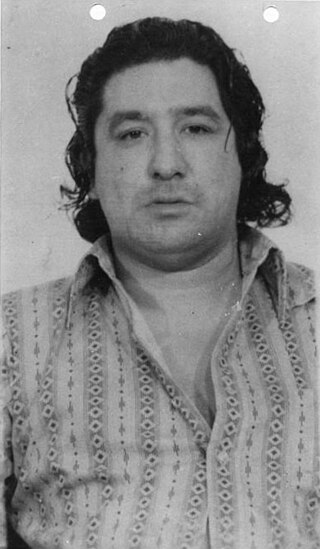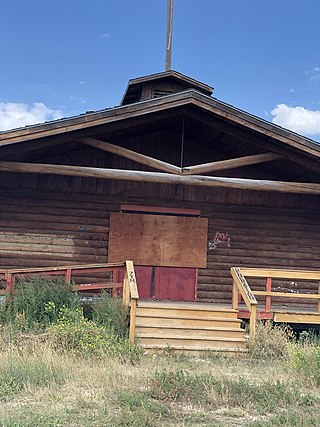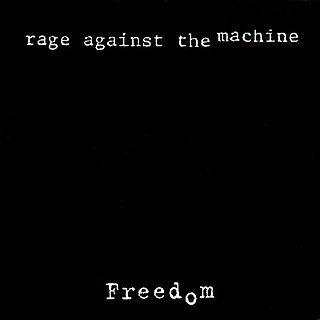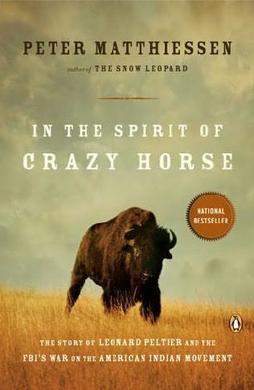
Leonard Peltier is a Native American activist and a member of the American Indian Movement (AIM) who was convicted of two counts of first degree murder in the deaths of two Federal Bureau of Investigation (FBI) agents in a June 26, 1975, shooting on the Pine Ridge Indian Reservation in South Dakota. He was sentenced to two consecutive terms of life imprisonment and has been imprisoned since 1976. Peltier became eligible for parole in 1993. As of 2024, Peltier is incarcerated at the United States Penitentiary, Coleman, in Florida.

William Moses Kunstler was an American attorney and civil rights activist, known for defending the Chicago Seven. Kunstler was an active member of the National Lawyers Guild, a board member of the American Civil Liberties Union (ACLU) and the co-founder of the Center for Constitutional Rights (CCR), the "leading gathering place for radical lawyers in the country."

The American Indian Movement (AIM) is an American Indian grassroots movement which was founded in Minneapolis, Minnesota in July 1968, initially centered in urban areas in order to address systemic issues of poverty, discrimination, and police brutality against American Indians. AIM soon widened its focus from urban issues to many Indigenous Tribal issues that American Indian groups have faced due to settler colonialism in the Americas. These issues have included treaty rights, high rates of unemployment, the lack of American Indian subjects in education, and the preservation of Indigenous cultures.

John Trudell was an American author, poet, actor, musician, and political activist. He was the spokesperson for the Indians of All Tribes' takeover of Alcatraz beginning in 1969, broadcasting as Radio Free Alcatraz. During most of the 1970s, he served as the chairman of the American Indian Movement, based in Minneapolis, Minnesota.
News From Indian Country was a privately owned newspaper, published once a month in the United States, founded by the journalist Paul DeMain (Ojibwe/Oneida) in 1986, who served as a managing editor and an owner. It was the oldest continuing, nationally distributed publication that was not owned by a tribal government. It offered national, cultural and regional sections, and "the most up-to-date pow-wow directory in the United States and Canada," according to its website. The newspaper was offered both in print and electronic form and has subscribers throughout the United States, Canada and 17 other countries.

The Pine Ridge Indian Reservation, also called Pine Ridge Agency, is an Oglala Lakota Indian reservation located in the U.S. state of South Dakota, with a small portion of it extending into Nebraska. Originally included within the territory of the Great Sioux Reservation, Pine Ridge was created by the Act of March 2, 1889, 25 Stat. 888. in the southwest corner of South Dakota on the Nebraska border. It consists of 3,468.85 sq mi (8,984 km2) of land area and is one of the largest reservations in the United States.

Dennis J. Banks was a Native American activist, teacher, and author. He was a longtime leader of the American Indian Movement, which he co-founded in Minneapolis, Minnesota in 1968 to represent urban Indians. He was a pre-eminent spokesman for Native Americans. His protests won government concessions and created national attention and sympathy for the oppression and endemic social and economic conditions for Native Americans.

Annie Mae Aquash was a First Nations activist and Mi'kmaq tribal member from Nova Scotia, Canada. Aquash moved to Boston in the 1960s and joined other First Nations and Indigenous Americans focused on education, resistance, and police brutality against urban Indigenous peoples. She was a member of the American Indian Movement (AIM) and participated in several occupations with them. In December 1975, she was kidnapped and murdered in the Pine Ridge Indian Reservation by members of AIM. Her body was later found in February 1976. In the 2000s, several members of AIM were convicted of kidnapping and murdering her.

Thunderheart is a 1992 American Neo-Western mystery film directed by Michael Apted from a screenplay by John Fusco. The film is a loosely based fictional portrayal of events relating to the Wounded Knee incident in 1973, when followers of the American Indian Movement seized the South Dakota town of Wounded Knee in protest against federal government policy regarding Native Americans. Incorporated in the plot is the character of Ray Levoi, played by actor Val Kilmer, as an FBI agent with Sioux heritage investigating a homicide on a Native American reservation. Sam Shepard, Graham Greene, Fred Ward and Sheila Tousey star in principal supporting roles. Also in 1992, Apted had previously directed a documentary surrounding a Native American activist episode involving the murder of FBI agents titled Incident at Oglala. The documentary depicts the indictment of activist Leonard Peltier during a 1975 shootout on the Pine Ridge Indian Reservation.

The Wounded Knee Occupation, also known as Second Wounded Knee, began on February 27, 1973, when approximately 200 Oglala Lakota and followers of the American Indian Movement (AIM) seized and occupied the town of Wounded Knee, South Dakota, United States, on the Pine Ridge Indian Reservation. The protest followed the failure of an effort of the Oglala Sioux Civil Rights Organization (OSCRO) to use impeachment to remove tribal president Richard Wilson, whom they accused of corruption and abuse of opponents. Protesters also criticized the United States government's failure to fulfill treaties with Native American people, and demanded the reopening of treaty negotiations with the goal of fair and equitable treatment of Native Americans.

"Freedom" is a song by American rock band Rage Against the Machine, released as the fourth and final single from their self-titled album in 1994.
Richard A. Wilson was elected chairman of the Oglala Lakota of the Pine Ridge Indian Reservation in South Dakota, where he served from 1972–1976, following re-election in 1974.

Robert Eugene Robideau was an American activist who was acquitted in the 1975 shooting deaths of two FBI agents in South Dakota.
Leonard Crow Dog was a medicine man and spiritual leader who became well known during the Lakota takeover of the town of Wounded Knee on the Pine Ridge Indian Reservation in South Dakota in 1973, known as the Wounded Knee Incident. Through his writings and teachings, he has sought to unify Indian people of all nations. As a practitioner of traditional herbal medicine and a leader of Sun Dance ceremonies, Crow Dog was also dedicated to keeping Lakota traditions alive.

In the Spirit of Crazy Horse is a book by Peter Matthiessen which chronicles "the story of Leonard Peltier and the FBI's war on the American Indian Movement." It was first published in 1983. Leonard Peltier was convicted of murder in 1977 and sentenced to life in prison for the 1975 killing of two FBI agents, after a trial which the author and many others allege was based on fabricated evidence, widespread fraud and government misconduct.
Richard Two Elk is a Native American combat veteran, journalist and civil rights activist. He is perhaps best known for participation in the Wounded Knee incident in the 1970s and for being a radio host.
Edgar Donroy Bear Runner was a Native American activist. He is perhaps best known for attempting to peacefully negotiate the Jumping Bull ranch incident in 1975 via parleying with American Indian Movement activists.
Frank Blackhorse is one of several aliases used by a member of the American Indian Movement. He is perhaps best known for his participation in the Wounded Knee incident, particularly his role in the shootout that left two FBI and one American Indian dead and for becoming a fugitive on the run who fled to Canada shortly after.
Darlene Nichols, also known by the names Kamook, Ka-Mook, Kamook Nichols and Ka-Mook Nichols, is the name of a former AIM member and Native American protester. She is best known for her role in the American Indian Movement for organizing The Longest Walk, and for serving as a key material witness in the trials of Arlo Looking Cloud, Richard Marshall, and John Graham that ultimately led to the conviction of two AIM members in the murders of Anna Mae Aquash.
Arlo Looking Cloud is a former Native American activist. He is best known for his involvement in the murder of fellow American Indian Movement activist Anna Mae Aquash. He was convicted of her murder and sentenced to life in prison.












